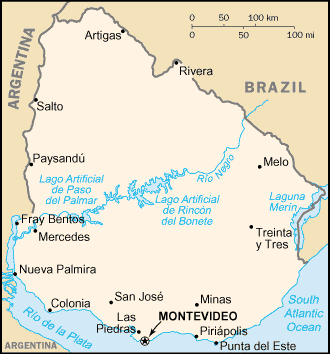Offshore incorporation in Uruguay offers substantial benefits. It is a low-tax jurisdiction with a high degree of financial privacy. Additionally, it may offer security for those looking for asset protection from lawsuits. Uruguay is the only nation in South America which offers a tax exempt vehicle for offshore incorporation. Often called “the Switzerland of South America”, Uruguay has traditionally been known for its relative affluence, robust educational system, social welfare programs, and well-developed financial sector known for banking secrecy.
Uruguay Background
Uruguay is located on the South Atlantic coastline of South America, east of Argentina and south of Brazil. It is the second smallest nation in South America after Suriname and about the size of the U.S. state of Washington. The nation is characterized by a free market economy with an export-oriented agricultural sector. It boasts a highly educated workforce and a strong social safety net for its citizens. In recent years, Uruguay has sought to expand trade within the Common Market of the South (Mercosur members), as well as with countries who are not members. Mercosur is a South American trade bloc.
The current administration has been in support of pro-market policies while maintaining a strong provision of social services for Uruguay’s citizens. Uruguay rates high on many development indexes and is known for its secular government and well-developed social security, health, and education systems. It is one of few nations in the region where the entire populous has access to clean water. Additionally, Uruguay provides free primary through university education for its citizens and was the first country in the world to provide a laptop for each elementary school student. The official language in Uruguay is Spanish and the GDP is roughly $21,395 per person, accounting for purchasing power parity. The nation is a founding member of Mercosur and is a member of many international and regional organizations including the United Nations, the Rio Group, and the Latin American Integration Association.
Uruguay Company Types
• Domestic Corporation
According to current Uruguayan law, the best way for an offshore entity to take advantage of tax benefits in Uruguay is through domestic incorporation. Because Uruguay only taxes income or assets which were obtained in Uruguay, companies who conduct all of their business offshore will not be liable for corporate tax.
Domestic incorporation has the added benefit of a company not being considered an offshore corporation internationally. This is particularly beneficial in the nations which hold double taxation avoidance agreements with Uruguay.
Keep in mind that tax law varies by country. So, the country where you reside may tax worldwide income.
• Free Zone Corporations (FZC)
Free zone corporations are corporations which are established within Uruguay’s special economic zones. These zones tend to appeal to corporations in certain business sectors. This includes the distribution and warehouse sector, call centers, shared services and financial services. It also includes professional services, and software development sectors. Consequently, Uruguay possesses a highly qualified, low wage workforce attractive to companies operating in these industries.
• Sociedad Anónima Financiera de Inversión (SAFI)
Prior to July 1, 2007, the most common type of incorporation for offshore companies in Uruguay was the Sociedad Anónima Financiera de Inversión (SAFI). SAFIs were required to conduct all of their business, activities, and operations outside Uruguay. They were able to conduct commercial activities and invest in securities and real estate. The major benefit to establishing a SAFI was that SAFIs paid an annual tax of just 0.3% of their net worth and were exempt from any other corporate taxes.
While SAFIs contributed in large part towards Uruguay earning its reputation as a tax haven, they were fully phased out by December 31, 2010. However, it is still completely possible to achieve the same tax incentives and operations in Uruguay today. Domestic corporations are the current preferred legal vehicle for offshore individuals and entities looking to take advantage of tax benefits in Uruguay.
Using an Uruguayan Corporation
- Collections and Payments Abroad
Many business people use Uruguayan corporations for collections and payments abroad, thereby making those collections and payments subject to only 0.3% tax.
- Licensing Patents or Trademarks
Uruguayan corporations can license patents and trademarks, making earnings from such licensing subject to only 0.3% tax.
- Investment Vehicle
The issuance of bearer shares makes Uruguayan corporations ideal investment vehicles for those looking for a high degree of financial secrecy.
- Transfer of Inheritance
Bearer shares also allow for inheritance to be transferred from an individual to a Uruguayan corporation, which may come in handy for reducing tax liability.
Benefits
- Tax Exemption
When correctly structured, offshore corporations in Uruguay are fully tax exempt from corporate tax liabilities or taxes on corporate earnings. Additionally, if income is sourced from outside Uruguay and remitted to the parent company of the offshore corporation, Uruguay withholding tax is not applicable.
- Double Taxation Avoidance Agreements
Not only does offshore incorporation help companies minimize taxes in Uruguay, it may be beneficial for foreign nationals from the following nations in avoiding double taxation in their home states:
- Ecuador
- Finland
- Germany
- Hungary
- India
- Korea
- Liechtenstein
- Luxembourg
- Malta
- Mexico
- Portugal
- Romania
- Singapore
- Spain
- Switzerland
- United Arab Emirates
- United Kingdom
- Vietnam
- Financial Privacy
Records pertaining to a corporation’s beneficial owner and shareholders are not available
to the public.
- Issuance of Bearer Shares
Uruguayan law allows for the issuance of bearer shares. Bearer stares are equity
securities which are owned in their entirety by whomever holds the physical stock
certificate. Because bearer shares do not require the registration of a stock owner or
records of transfers of ownership. They can make an ideal legal vehicle for those seeking an
additional measure of financial privacy.
- Expediency
An offshore incorporation in Uruguay can be structured in as few as two months, making it an excellent option for those who need to finalize their incorporation quickly. It is also possible, and fairly common, to buy off the shelf companies which have already been incorporated and authorized without any prior business activities, in order to start operations in as little as 72 hours.
- Low Share Capital Threshold
Offshore corporations in Uruguay can be started with as little as US $ 1 of share capital.
- Minimalist Stakeholder Requirement
Uruguay law requires only one shareholder and one director of any nationality for incorporation within its borders.
- Corporate Bank Account with Substantial Benefits
Offshore companies in Uruguay are allowed to open corporate bank accounts with no restrictions on the amount of foreign currency the account can hold, no limit on foreign transfers, and no Central Bank commission fees on foreign transfers.
Requirements for Offshore Incorporation in Uruguay
- Minimum Flat Tax
Uruguayan offshore corporations are required to pay a minimum flat tax called ICOSA which is valued at roughly US$ 500 per year.
- Bank Account Tax
If an offshore company based in Uruguay holds a Uruguayan bank account, it is liable for an annual tax of 1.5% on the total value of the assets held in the account during the fiscal year. You can, however, hold your corporate account outside of Uruguay and avoid this tax.
- Accounting Requirements
Offshore companies registered in Uruguay are required to file unedited financial statements every year and keep accounting records.
- Meeting Minutes
Uruguayan law stipulates that all companies operating from within its borders must hold an annual shareholders meeting. The company principles then file the minutes of that meeting with the Companies Registrar, or Registro de Empresas, within 30 days after holding the meeting. This meeting must take place within Uruguayan borders, however, it is possible for shareholders to send proxies in lieu of attending in person.
- Business Must Be Conducted Offshore for Tax Benefits
Uruguayan offshore companies which conduct business within the borders of Uruguay are subject to a 25% corporate tax on locally-sourced income.
How to Obtain an Uruguayan Corporation
- Buying a corporation
On can purchase Uruguayan corporations off the shelf and ready to commence operations within 72 hours of the confirmation of sale. A minimum of one person and a maximum of seven members can sit on the board of directors. These people can be residents or non-residents of Uruguay and can be of any nationality. They do not have to be shareholders of the corporation but they must come to Uruguay to sign the company’s documents in person, as the signatures must be certified by a notary public. Fortunately, in most cases, local agent fulfills this requirement on your behalf.
The company is also required to have a minimum of one shareholder, which can be a resident or non-resident individual or legal entity of any nationality. It is not required to register the name of the shareholders when acquiring a company and, as a result, travel to Uruguay is not necessary for the shareholder or shareholders. The following articles of incorporation can be amended at any time according to Uruguayan law in order to adapt to the requirements of the shareholders:
- Name of the company
- Capital
- Type of shares
- Value of each share
- Purpose
- Representation by the directors







